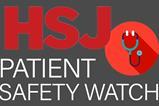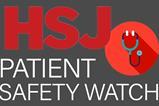HSJ is now hosting the Patient Safety Watch newsletter, written by Patient Safety Watch chief executive James Titcombe.
Good afternoon and welcome to this fortnight’s Patient Safety Watch newsletter.
Martha’s Rule to be introduced from April
NHS England has announced Martha’s Rule will be rolled out across at least 100 NHS sites in England from April, creating a 24/7 right for patients, their families and their carers to get an urgent review if they are concerned their or their loved one’s condition is deteriorating.
Martha’s Rule is named after 13-year-old Martha Mills who died of sepsis in 2021 after her doctors failed to escalate her care and failed to listen to her family’s concerns about her worsening condition.
Her parents Merope Mills and Paul Laity have been pivotal in campaigning for the changes. They said: “Our daughter was quite something: fun and determined, with a vast appetite for life and so many plans and ambitions – we’ll never know what she would have achieved with all her talents. Hers was a preventable death, but Martha’s Rule will mean that she didn’t die completely in vain.”
NHSE chief executive Amanda Pritchard added: “Hearing about the heartbreaking loss of Martha and the experiences of her family, has had a major impact for people right across the country, with parents, patients and NHS staff welcoming her parents’ call for a simple process to escalate concerns when they can see a loved one’s condition worsening.”
Change in the NHS can feel painfully slow, but every so often a moment comes along when something truly transformational happens. Martha’s tragic loss and the love of her parents is one of those moments. We hope Martha’s Rule is destined to forever change the NHS for the better.
Sepsis mistakes ‘being repeated time and time again’
An HSJ investigation has found more than 30 sepsis deaths in the last five years where coroners have warned of systemic problems with diagnosing and treating the condition.
Coroners’ concerns included delays or failures to administer antibiotics, not following protocols for identifying sepsis, and inaccurate, missed or skipped observations. Nine of the cases HSJ found related to children.
Health ombudsman Rob Behrens, who published a report on sepsis failures last year, told HSJ the same mistakes were “clearly being repeated time and time again”.
He added: “What is chilling to me is that these [coroners’ reports] fit in almost exactly with the issues we raised in our sepsis report… and even the 2013 sepsis report issued by my predecessor, including unnecessary delays, wrong diagnosis, and failure to provide adequate plans for sepsis.”
New mums report ‘racism’ at Nottingham Hospitals
BBC News has reported that Donna Ockenden, who is leading the inquiry into maternity failings at Nottingham University Hospitals Trust, has written an open letter to the trust’s chief executive to flag the “countless” examples of racist and discriminatory behaviour her review has uncovered.
Her letter to Anthony May said the “racist and discriminatory behaviour” has been experienced on “countless occasions” by service users “from a range of care givers throughout maternity services”.
The trust told the broadcaster action was already being taken to address the latest findings.
The BBC has also reported £101m was paid out in maternity claims against NUH between 2006-2023, relating to 134 cases at its Queen’s Medical Centre and City Hospital. Of this, £85m was paid to families who proved their baby’s death or injury resulted from medical negligence, £11m was for claimants’ legal fees and £5m was for the trust’s solicitors.
New group adds voice to maternity inquiry calls
The With Woman Movement – a new campaign group launched by three midwives – is calling for a “national inquiry into safer, evidenced-based, maternity care”.
The campaign’s Facebook group, which already has more than 1,000 members, reads: “We believe that safe maternity care involves doctors, midwives and other professionals working together as one team – sharing a common view of what good maternity care looks like and working in partnership with women, and families to respect individual choices and prioritise safe and personal care”.
“We recognise the urgent need for comprehensive reform in maternity care across the NHS. The troubling prevalence of inadequacies and ethnic disparities, untimely deaths and preventable harm among mothers, babies and all birthing people demands immediate action.”
This newsletter has previously highlighted other important campaigns calling for a national maternity inquiry – but are the voices of parents, families and maternity professionals being heard?
Ombudsman report shines spotlight on discharge from mental health care
A report – Discharge from mental health care: making it safe and patient-centred – from the Parliamentary and Health Service Ombudsman last month highlighted care failings around discharge from inpatient mental health services or emergency departments after analysing more than 100 complaints that the watchdog investigated between April 2020 and September 2023.
Mr Behrens said: “The cases highlighted in this report show what happens when transfers of mental health care go tragically wrong. They demonstrate why collaboration between health and care professionals, families, carers, and individuals is key, and why allowing the time for clear and honest communication around decision-making and care planning is vital.”
NHSE launches new competency framework for board members
NHSE this week published a new competency framework for all board members of NHS providers, integrated care boards and NHSE itself. It builds on Tom Kark’s 2019 review of the fit and proper person test.
The framework covers six domains, which are:
- Driving high-quality and sustainable outcomes;
- Setting strategy and delivering long-term transformation;
- Promoting equality and inclusion, and reducing health and workforce inequalities;
- Providing robust governance and assurance;
- Creating a compassionate, just and positive culture; and
- Building a trusted relationship with partners and communities.
A welcome development, but as with all new policy initiatives, good implementation supported with resources and meaningful processes for ensuring standards are met will be crucial.
Regulator chief to stand down later this year
Medicines and Healthcare products Regulatory Agency chief executive Dame June Raine has announced she will leave the role later this year after five years in post.
Dame June said: “It has been an honour to lead an agency which has patient safety as its top priority and makes a difference to the lives of everyone in the UK. While I am stepping back from my MHRA role, I hope still to be involved in contributing to patient safety and public health in other ways.”
Royal Mail’s plans put patient safety ‘at risk’, say health groups
In an open letter to Royal Mail, sent this week, Healthwatch England, National Voices, The Patients Association and NHS Providers raised concerns about media reports that the organisation planned to delay bulk mail of NHS appointment letters.
The letter writers said they had heard of several instances where letters were already arriving either after the scheduled appointment date or at such short notice that it had created issues arranging childcare, travel or time off work.
The letter read: “When appointment letters and other communications from the NHS are delayed, patient safety is put at risk, while NHS teams must deal with the fall-out of missed appointments.”
Sharing some good stuff…
The UK Sepsis Trust has developed Spotting The Unwell Child – an important initiative created by a multi-professional team with input from a variety of stakeholders designed to provide parents and carers with information to recognise not just the signs of sepsis when their child is discharged from hospital but also what a deteriorating child looks like.
Founder and joint CEO of the UK Sepsis Trust Ron Daniels said: “Empowering parents with the knowledge to recognise the signs of sepsis in their child is not just about awareness; it’s about equipping them with the language and confidence to communicate effectively with healthcare professionals. This leaflet… helps parents decipher what ‘worse’ looks like, enabling them to speak up and advocate for their child’s health with clarity and conviction.”
Anand Nitin Kanani, consultant paediatrician at Birmingham Women’s and Children’s Hospital – where the leaflet is already in use – added: “This is an effective project as the multi-team approach ensures it is standard practice across all times of day and all days of the week… There has been lots of positive feedback from staff.”
Several other trusts are also set to adopt the initiative. For more information or to get involved, please contact Melissa Mead here
Getting the best out of SEIPS
The Clinical Human Factors Group has announced a new date – 15 March 2023 – for its ever-popular Systems Engineering Initiative for Patient Safety masterclass. The three-hour class focuses on using SEIPS in healthcare and is delivered by Dawn Benson – who has extensive experience in using and teaching SEIPS as a human factors tool in health and social care safety investigations – alongside clinical subject experts.
More information and how to book is available here.
That’s all for this edition. Please look out for our next newsletter in two weeks’ time. In the meantime, thanks for reading and please stay safe.
James Titcombe































1 Readers' comment